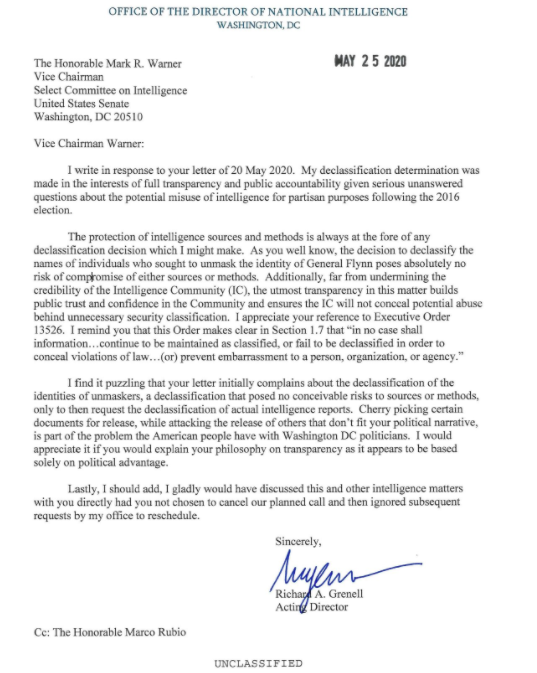In one of his final moves as acting spy chief, Richard Grenell said the Senate Intelligence Committee’s top Democrat was “cherry-picking” the intelligence he wanted to be made public.
Grenell, who was replaced by John Ratcliffe as director of national intelligence, defended his work against claims that he was the one selectively declassifying material to benefit President Trump and his allies politically.
“My declassification determination was made in the interests of full transparency and public accountability given serious unanswered questions about the potential misuse of intelligence for partisan purposes following the 2016 election,” Grenell wrote in a one-page letter to Sen. Mark Warner, the ranking member of the intelligence panel. “The protection of intelligence sources and methods is always at the fore of any declassification decision which I might make. As you well know, the decision to declassify the names of individuals who sought to unmask the identity of General Flynn poses absolutely no risk of compromises of either sources or methods.”
This was a reference to the declassified National Security Agency document containing a list of dozens of Obama administration officials, including former Vice President Joe Biden, who were authorized recipients of information in response to “unmasking” requests that revealed former Trump national security adviser Michael Flynn’s identity in surveillance intercepts. Flynn’s name was reportedly not masked in the FBI reports on his conversations with Russian Ambassador to the U.S. Sergey Kislyak during the presidential transition period.
Grenell also wrote, “Far from undermining the credibility of the Intelligence Community, the utmost transparency in this matter builds public trust and confidence in the [Intelligence] Community and ensures the IC will not conceal potential abuse behind unnecessary security classification.”
Warner, a Virginia Democrat, sent a two-page letter to Grenell last week asking him to release a host of documents related to Flynn and the unmasking controversy.
He asked Grenell to “provide the rationale for declassifying these unmasking reports, given the potential compromise to sources and methods” and said that “selective declassification for political purposes undermines the integrity of our system for protecting classified information.”
“I further request that you declassify and make publicly available any intelligence report concerning conversations between Lt. Gen. Flynn (ret.) and Russian Ambassador to the United States, Sergey Kislyak,” Warner wrote. “These calls have been the topic of multiple investigations, trials, and plea agreements concerning General Flynn and merit being in the public domain … [and] I ask that you provide the committee with the underlying intelligence reports in which the identity of the identical was ‘unmasked’ to be Flynn.”
Grenell said this request by Warner seemed contradictory.
“I find it puzzling that your letter initially complains about the declassification of the identities of unmaskers, a declassification that posed no conceivable risks to sources or methods, only to then request the declassification of actual intelligence reports,” Grenell wrote. “Cherry-picking certain documents for release, while attacking the release of others that don’t fit your political narrative, is part of the problem the American people have with Washington D.C. politicians. I would appreciate it if you would explain your philosophy on transparency as it appears to be based solely on political advantage.”
Grenell added that he “gladly would have discussed this and other intelligence matters with you directly” but said Warner canceled their phone call and ignored efforts by the Office of the Director of National Intelligence to reschedule.
Flynn pleaded guilty in December 2017 to lying to investigators about his December 2016 conversations with Kislyak. The U.S. government intercepted Flynn’s discussions with Kislyak, after which former FBI agent Peter Strzok and another agent, Joseph Pientka, interviewed him on Jan. 24, 2017, about the contents of the discussion. Former FBI Director James Comey said in 2018 that he took advantage of the chaos in the early days of Trump’s administration when he sent the FBI agents.
After changing legal teams, Flynn said at the start of this year that he was “innocent of this crime” and sought to withdraw his guilty plea. The Justice Department moved to dismiss the charges against him this month after new evidence was unearthed, but the judge presiding over the case has resisted doing so immediately, inviting outside opinions and appointing a retired judge to argue against the motion to dismiss and explore whether Flynn should be held in contempt for perjury.
At the behest of Democrats and Republicans alike, as well as Flynn’s defense team, Grenell said last week he started the declassification process for those Flynn-Kislyak calls, which are in control of the ODNI but stressed that not all of them were in its possession.


